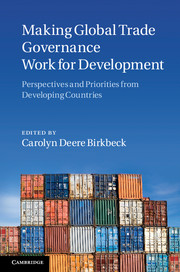 Making Global Trade Governance Work for Development
Making Global Trade Governance Work for Development Book contents
- Frontmatter
- Contents
- Figures
- Tables and boxes
- Contributors
- Acknowledgements
- Introduction
- Part I Global trade governance
- Part II Roles and responsibilities in global trade governance: diversity in developing country priorities and strategies
- Part III Strengthening multilateralism
- 10 The WTO, democracy and development: a view from the South
- 11 Reclaiming development in the world trading system (revisited): proposals for reform of WTO governance
- 12 Fostering developing country engagement in the WTO dispute settlement system
- 13 Rethinking the governance of Aid for Trade
- 14 Strengthening WTO surveillance
- 15 Why not an ombudsperson at the WTO? A proposal for debate
- Part IV Making WTO negotiations and decision-making processes fairer
- Part V Conclusion
- Index
- References
11 - Reclaiming development in the world trading system (revisited): proposals for reform of WTO governance
from Part III - Strengthening multilateralism
Published online by Cambridge University Press: 07 September 2011
- Frontmatter
- Contents
- Figures
- Tables and boxes
- Contributors
- Acknowledgements
- Introduction
- Part I Global trade governance
- Part II Roles and responsibilities in global trade governance: diversity in developing country priorities and strategies
- Part III Strengthening multilateralism
- 10 The WTO, democracy and development: a view from the South
- 11 Reclaiming development in the world trading system (revisited): proposals for reform of WTO governance
- 12 Fostering developing country engagement in the WTO dispute settlement system
- 13 Rethinking the governance of Aid for Trade
- 14 Strengthening WTO surveillance
- 15 Why not an ombudsperson at the WTO? A proposal for debate
- Part IV Making WTO negotiations and decision-making processes fairer
- Part V Conclusion
- Index
- References
Summary
In a world where the vast majority of nations are developing countries and a significant portion of the world population still suffers from crushing poverty, economic development is one of the most important global issues. The importance of international trade for successful economic development, as shown in the cases of South Korea, Taiwan, Singapore, Hong Kong, and, more recently, China, has been well documented (World Bank 1993; Findlay 1984; Krueger 1984; Helleiner 1992 and Srinivasan 2001), and it is essential that the international governance and regulatory framework for international trade is structured in a way that facilitates, rather than hampers, the economic development of developing countries.
The World Trade Organization (WTO) is the most comprehensive international governance and regulatory framework for international trade. Currently, the WTO’s 153 Members include all major economies and trading nations, except perhaps Russia. WTO rules outline the fundamental legal principles that govern conduct on international trade and all WTO legal disciplines are mandatory for Members. The WTO dispute settlement body adjudicates trade dispute cases brought up by a Member State and rule violations alleged to be committed by another. Various report mechanisms of the WTO also monitor conduct of Member States on international trade and ensure their compliance with WTO disciplines. Thus, the WTO has become the ‘United Nations’ of international trade and its rules constitute an international law of trade that can be specifically enforced.
Information
- Type
- Chapter
- Information
- Making Global Trade Governance Work for DevelopmentPerspectives and Priorities from Developing Countries, pp. 301 - 327Publisher: Cambridge University PressPrint publication year: 2011